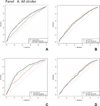Predicting stroke through genetic risk functions: the CHARGE Risk Score Project
- PMID: 24436238
- PMCID: PMC3955258
- DOI: 10.1161/STROKEAHA.113.003044
Predicting stroke through genetic risk functions: the CHARGE Risk Score Project
Abstract
Background and purpose: Beyond the Framingham Stroke Risk Score, prediction of future stroke may improve with a genetic risk score (GRS) based on single-nucleotide polymorphisms associated with stroke and its risk factors.
Methods: The study includes 4 population-based cohorts with 2047 first incident strokes from 22,720 initially stroke-free European origin participants aged ≥55 years, who were followed for up to 20 years. GRSs were constructed with 324 single-nucleotide polymorphisms implicated in stroke and 9 risk factors. The association of the GRS to first incident stroke was tested using Cox regression; the GRS predictive properties were assessed with area under the curve statistics comparing the GRS with age and sex, Framingham Stroke Risk Score models, and reclassification statistics. These analyses were performed per cohort and in a meta-analysis of pooled data. Replication was sought in a case-control study of ischemic stroke.
Results: In the meta-analysis, adding the GRS to the Framingham Stroke Risk Score, age and sex model resulted in a significant improvement in discrimination (all stroke: Δjoint area under the curve=0.016, P=2.3×10(-6); ischemic stroke: Δjoint area under the curve=0.021, P=3.7×10(-7)), although the overall area under the curve remained low. In all the studies, there was a highly significantly improved net reclassification index (P<10(-4)).
Conclusions: The single-nucleotide polymorphisms associated with stroke and its risk factors result only in a small improvement in prediction of future stroke compared with the classical epidemiological risk factors for stroke.
Keywords: genetic epidemiology; risk factors; stroke.
Figures



References
-
- Mukherjee D, Patil CG. Epidemiology and the global burden of stroke. World Neurosurg. 2011;76:S85–S90. - PubMed
-
- Strong K, Mathers C, Bonita R. Preventing stroke: Saving lives around the world. Lancet neurology. 2007;6:182–187. - PubMed
-
- Bak S, Gaist D, Sindrup SH, Skytthe A, Christensen K. Genetic liability in stroke: A long-term follow-up study of danish twins. Stroke a journal of cerebral circulation. 2002;33:769–774. - PubMed
-
- Bevan S, Traylor M, Adib-Samii P, Malik R, Paul NL, Jackson C, et al. Genetic heritability of ischemic stroke and the contribution of previously reported candidate gene and genomewide associations. Stroke a journal of cerebral circulation. 2012;43:3161–3167. - PubMed
Publication types
MeSH terms
Grants and funding
- R01 HL059367/HL/NHLBI NIH HHS/United States
- K24 DK080140/DK/NIDDK NIH HHS/United States
- N01 HC085079/HL/NHLBI NIH HHS/United States
- R01 HL080295/HL/NHLBI NIH HHS/United States
- HL080295/HL/NHLBI NIH HHS/United States
- N01 HC085081/HL/NHLBI NIH HHS/United States
- R01 DK078616/DK/NIDDK NIH HHS/United States
- HHSN268201100012C/HL/NHLBI NIH HHS/United States
- UL1RR025005/RR/NCRR NIH HHS/United States
- Z01 AG000954-06/AG/NIA NIH HHS/United States
- N02-HL-6-4278/HL/NHLBI NIH HHS/United States
- N01-HC-25195/HC/NHLBI NIH HHS/United States
- UL1 RR033176/RR/NCRR NIH HHS/United States
- HHSN268201100009I/HL/NHLBI NIH HHS/United States
- N01 HC085080/HL/NHLBI NIH HHS/United States
- UL1RR033176/RR/NCRR NIH HHS/United States
- UL1TR000124/TR/NCATS NIH HHS/United States
- AG027058/AG/NIA NIH HHS/United States
- R01 NS017950/NS/NINDS NIH HHS/United States
- AG15928/AG/NIA NIH HHS/United States
- N01HC85084/HC/NHLBI NIH HHS/United States
- Z01 AG000954/ImNIH/Intramural NIH HHS/United States
- R01 AG016495/AG/NIA NIH HHS/United States
- R01HL59367/HL/NHLBI NIH HHS/United States
- HHSN268201100010C/HL/NHLBI NIH HHS/United States
- N01HC85239/HC/NHLBI NIH HHS/United States
- K24DK080140/DK/NIDDK NIH HHS/United States
- UL1 RR025005/RR/NCRR NIH HHS/United States
- R01 AG015928/AG/NIA NIH HHS/United States
- HHSN268201100008C/HL/NHLBI NIH HHS/United States
- U01 HL080295/HL/NHLBI NIH HHS/United States
- U01 HL096917/HL/NHLBI NIH HHS/United States
- HHSN268201100008I/HL/NHLBI NIH HHS/United States
- HHSN268201100005G/HL/NHLBI NIH HHS/United States
- N01 HC085082/HL/NHLBI NIH HHS/United States
- HHSN268201100007C/HL/NHLBI NIH HHS/United States
- HL105756/HL/NHLBI NIH HHS/United States
- N01 HC015103/HC/NHLBI NIH HHS/United States
- N01 HC085086/HL/NHLBI NIH HHS/United States
- N01 HC085083/HL/NHLBI NIH HHS/United States
- R56 AG020098/AG/NIA NIH HHS/United States
- N01HC85085/HC/NHLBI NIH HHS/United States
- HHSN268201100011I/HL/NHLBI NIH HHS/United States
- HHSN268201100011C/HL/NHLBI NIH HHS/United States
- R01 HL086694/HL/NHLBI NIH HHS/United States
- N01 HC085085/HC/NHLBI NIH HHS/United States
- AG033193/AG/NIA NIH HHS/United States
- R01 HL087652/HL/NHLBI NIH HHS/United States
- Z01 AG007270/ImNIH/Intramural NIH HHS/United States
- HL087652/HL/NHLBI NIH HHS/United States
- UL1 TR000124/TR/NCATS NIH HHS/United States
- HHSN268200625226C/PHS HHS/United States
- U01 HG004402/HG/NHGRI NIH HHS/United States
- R01 HL093029/HL/NHLBI NIH HHS/United States
- N01HC45133/HC/NHLBI NIH HHS/United States
- R01HL70825/HL/NHLBI NIH HHS/United States
- R01 HL105756/HL/NHLBI NIH HHS/United States
- U01HG004402/HG/NHGRI NIH HHS/United States
- P30 DK063491/DK/NIDDK NIH HHS/United States
- HHSN268201100006C/HL/NHLBI NIH HHS/United States
- R01 AG008122/AG/NIA NIH HHS/United States
- HHSN268201200036C/HL/NHLBI NIH HHS/United States
- N01 HC025195/HL/NHLBI NIH HHS/United States
- R01 AG033193/AG/NIA NIH HHS/United States
- R01HL087641/HL/NHLBI NIH HHS/United States
- N01 HC055222/HL/NHLBI NIH HHS/United States
- HHSN268201100005I/HL/NHLBI NIH HHS/United States
- N01 HC085084/HC/NHLBI NIH HHS/United States
- R01 AG020098/AG/NIA NIH HHS/United States
- AG081220/AG/NIA NIH HHS/United States
- HHSN268201100009C/HL/NHLBI NIH HHS/United States
- R01 HL070825/HL/NHLBI NIH HHS/United States
- HHSN268201100005C/HL/NHLBI NIH HHS/United States
- DK063491/DK/NIDDK NIH HHS/United States
- AG16495/AG/NIA NIH HHS/United States
- HHSN268201100007I/HL/NHLBI NIH HHS/United States
- N01HC15103/HC/NHLBI NIH HHS/United States
- P30 AG010129/AG/NIA NIH HHS/United States
- AG20098/AG/NIA NIH HHS/United States
- N01 HC075150/HL/NHLBI NIH HHS/United States
- R01 AG023629/AG/NIA NIH HHS/United States
- R01 HL087641/HL/NHLBI NIH HHS/United States
- N01HC35129/HC/NHLBI NIH HHS/United States
- R01 AG027058/AG/NIA NIH HHS/United States
- N01 HC045133/HC/NHLBI NIH HHS/United States
- AG023629/AG/NIA NIH HHS/United States
- N01 HC035129/HC/NHLBI NIH HHS/United States
- R56 AG023629/AG/NIA NIH HHS/United States
- R01HL086694/HL/NHLBI NIH HHS/United States
- U01 AG049505/AG/NIA NIH HHS/United States
LinkOut - more resources
Full Text Sources
Other Literature Sources
Medical

